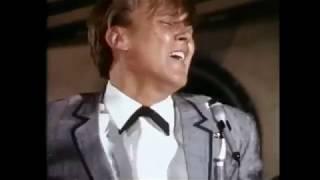DISCLAIMER: All rights reserved to the production companies and music labels that distributed and produced the music and performance respectively. I've only added the footage as a tribute for historical, entertainment, and creative purposes with no financial gain. Copyright infringement not intended.
Donald Woods And The Vel-Aires "This Paradise" Flip 303 A 1955
This is a Mint- copy of this great R&B Hit! Enjoy!!
The complex (even for a California group) story of the Medallions begins in early 1954 with a bunch of friends who lived in the Watts and Compton areas of Los Angeles. Vernon Green (tenor), Randolph Bryant (tenor), Willie "Butternut" Graham (second tenor), Rudolph Brown (baritone), and a bass remembered by all only as Chuck began singing together in parks and street corners. One day, Randolph saw a movie that featured 17th Century characters wearing medallions. That was as good a name as any for the fledgling group, and for a while all the guys wore them.
Vernon was heavily into writing songs, and the guys would practice them (in the car, of course), each one adding something to the lyrics or tune. This was, of course, in addition to the R&B hits of the day that they learned from the radio. Almost from the very beginning, the story of the Medallions became incredibly complicated. Neither Rudolph Brown nor Chuck ever recorded with the group again, although they would continue to appear with them from time to time. They were replaced, on record, by tenor Donald Woods and bass Ira Foley, both friends of Randolph Bryant. In fact, the Medallions were a loose knit organization of eight or nine singers who were used whenever they were available. The recording Medallions were now: Vernon Green, Willie Graham, Donald Woods, Randolph Bryant, and Ira Foley.
However, friction developed. Both Vernon and Donald were prolific songwriters, and of course each wanted to record his own songs. Dootsie sided with Vernon (wanting to call the group "Vernon Green and the Medallions"), so that he and Donald quarrelled also.
Around December, Donald, Willie, Randolph, and Ira had decided to form their own group (which, in keeping with the car theme, they called the Bel-Aires). Randolph was the last to leave, singing with both groups at the same time! When there was a gig, they would perform as the Medallions (whether or not Vernon was around), unless the show was put on by Dootsie, in which case the Medallions would be Vernon, Willie, Randolph, and Ira. One of the strange results of this was that Dootsie took the photo of the 5-man Medallions, cut out Donald's head, and re-arranged the others to look like a quartet.
The Bel-Aires had signed a recording contract with Max Feirtag's brand-new Flip label (which used the same distributor as Dootone) on January 24, 1955. On February 4, they recorded four sides: "This Paradise," "White Port And Lemon Juice," "This Is Goodbye," and "Let's Party Awhile." Their first release, later in February, was "This Paradise," backed with "Let's Party Awhile." The Bel-Aires' "This Paradise" wasn't reviewed in the trades until the week of May 21, 1955, at the same time as the Midnighters' "Henry's Got Flat Feet," the Dappers' "Come Back To Me," the 5 Owls' "Pleading To You," and the Empires' "Magic Mirror." Also in May, the group's next record was issued, using masters from their February session: "White Port And Lemon Juice," backed with "This Is Goodbye" (with a Medallions-style recitation). On May 27, they had another session, which produced four more masters: "Death Of An Angel," "Man From Utopia," "Stay With Me Always," and "My Very Own." All were led by Donald Woods, except "Stay With Me Always," fronted by Randolph Bryant.
In June, Flip issued the group's third record, but by then their name had been changed to the "Vel-Aires." It's probable that this was due to the existence of another West Coast Bel-Aires, this one a black and white duo that had covered Marvin & Johnny's "Tick Tock" on Crown in 1954. The record featured two tunes from the May 27 session: "Death Of An Angel" (with Willie screaming and Randolph crying) and "Man From Utopia." Other new records that week were the Cardinals' "Come Back My Love," the Tenderfoots' "Sindy," the Jacks' "Since My Baby's Been Gone," the Meadowlarks' "Always And Always," the Larks' "Honey From The Bee," the Smoothtones' "Bring Back Your Love," and the Chromatics' "Don't Know Why I Cry."
Turntable used: Audio Technica AT-LP120 USB Direct Drive inputted straight into the sound card using the built-in pre-amp from the turntable.
Cartridge used: Audio Technica AT440 MLa Dual moving coil cartridge
using a ATN 440MLa microfine nude shank Stylus Needle for
33's & 45's. 0.4 X 0.7 Mil.micro-fine torodorial.
Donald Woods And The Vel-Aires "This Paradise" Flip 303 A 1955
This is a Mint- copy of this great R&B Hit! Enjoy!!
The complex (even for a California group) story of the Medallions begins in early 1954 with a bunch of friends who lived in the Watts and Compton areas of Los Angeles. Vernon Green (tenor), Randolph Bryant (tenor), Willie "Butternut" Graham (second tenor), Rudolph Brown (baritone), and a bass remembered by all only as Chuck began singing together in parks and street corners. One day, Randolph saw a movie that featured 17th Century characters wearing medallions. That was as good a name as any for the fledgling group, and for a while all the guys wore them.
Vernon was heavily into writing songs, and the guys would practice them (in the car, of course), each one adding something to the lyrics or tune. This was, of course, in addition to the R&B hits of the day that they learned from the radio. Almost from the very beginning, the story of the Medallions became incredibly complicated. Neither Rudolph Brown nor Chuck ever recorded with the group again, although they would continue to appear with them from time to time. They were replaced, on record, by tenor Donald Woods and bass Ira Foley, both friends of Randolph Bryant. In fact, the Medallions were a loose knit organization of eight or nine singers who were used whenever they were available. The recording Medallions were now: Vernon Green, Willie Graham, Donald Woods, Randolph Bryant, and Ira Foley.
However, friction developed. Both Vernon and Donald were prolific songwriters, and of course each wanted to record his own songs. Dootsie sided with Vernon (wanting to call the group "Vernon Green and the Medallions"), so that he and Donald quarrelled also.
Around December, Donald, Willie, Randolph, and Ira had decided to form their own group (which, in keeping with the car theme, they called the Bel-Aires). Randolph was the last to leave, singing with both groups at the same time! When there was a gig, they would perform as the Medallions (whether or not Vernon was around), unless the show was put on by Dootsie, in which case the Medallions would be Vernon, Willie, Randolph, and Ira. One of the strange results of this was that Dootsie took the photo of the 5-man Medallions, cut out Donald's head, and re-arranged the others to look like a quartet.
The Bel-Aires had signed a recording contract with Max Feirtag's brand-new Flip label (which used the same distributor as Dootone) on January 24, 1955. On February 4, they recorded four sides: "This Paradise," "White Port And Lemon Juice," "This Is Goodbye," and "Let's Party Awhile." Their first release, later in February, was "This Paradise," backed with "Let's Party Awhile." The Bel-Aires' "This Paradise" wasn't reviewed in the trades until the week of May 21, 1955, at the same time as the Midnighters' "Henry's Got Flat Feet," the Dappers' "Come Back To Me," the 5 Owls' "Pleading To You," and the Empires' "Magic Mirror." Also in May, the group's next record was issued, using masters from their February session: "White Port And Lemon Juice," backed with "This Is Goodbye" (with a Medallions-style recitation). On May 27, they had another session, which produced four more masters: "Death Of An Angel," "Man From Utopia," "Stay With Me Always," and "My Very Own." All were led by Donald Woods, except "Stay With Me Always," fronted by Randolph Bryant.
In June, Flip issued the group's third record, but by then their name had been changed to the "Vel-Aires." It's probable that this was due to the existence of another West Coast Bel-Aires, this one a black and white duo that had covered Marvin & Johnny's "Tick Tock" on Crown in 1954. The record featured two tunes from the May 27 session: "Death Of An Angel" (with Willie screaming and Randolph crying) and "Man From Utopia." Other new records that week were the Cardinals' "Come Back My Love," the Tenderfoots' "Sindy," the Jacks' "Since My Baby's Been Gone," the Meadowlarks' "Always And Always," the Larks' "Honey From The Bee," the Smoothtones' "Bring Back Your Love," and the Chromatics' "Don't Know Why I Cry."
Turntable used: Audio Technica AT-LP120 USB Direct Drive inputted straight into the sound card using the built-in pre-amp from the turntable.
Cartridge used: Audio Technica AT440 MLa Dual moving coil cartridge
using a ATN 440MLa microfine nude shank Stylus Needle for
33's & 45's. 0.4 X 0.7 Mil.micro-fine torodorial.
- Category
- Pop
Sign in or sign up to post comments.
Be the first to comment


